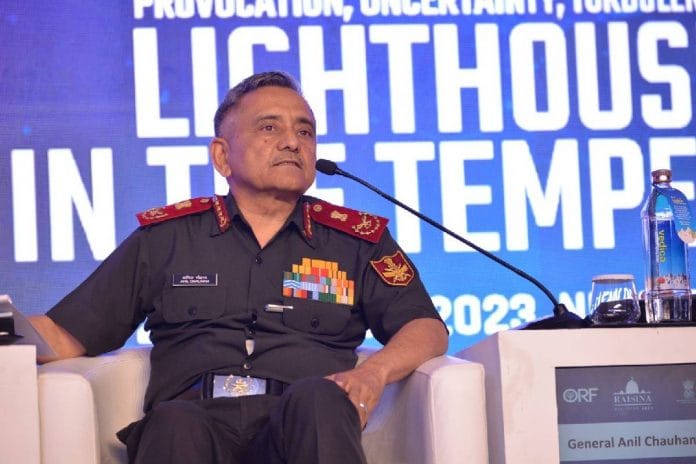New Delhi: The Russia-Ukraine war has demonstrated the need to develop “smart weapons for short, intense conflicts” and “conventional weapons” for potential longer-term wars for nations like India, Chief of Defence Staff (CDS) General Anil Chauhan said Friday.
Speaking at the Raisina Dialogue 2023, organised by the Observer Research Foundation (ORF) and the Ministry of External Affairs, Chauhan said the biggest lesson from the war for India is that it needs to be “self-reliant in weapons production”.
The session, titled ‘The Old, The New, and The Unconventional: Assessing Contemporary Conflicts’, was moderated by Firstpost managing editor Palki Sharma. Chief of the Defence Force of Australia General Angus J. Campbell and USA’s former secretary of defense General Jim Mattis also spoke at the event.
“… the paradigm [of warfare] is now changed. The lesson for India, as far as I can see, is self-reliance or Aatmanirbhar Bharat. We can’t be dependent on supply on weapons systems from outside anymore,” Chauhan said.
“We don’t expect any long-term conflict in India but going forward, we should have a healthy mix of both smart weapons [with newer technologies] for short, intense wars, and also large numbers of conventional weapons that will also require a lot of personnel to operate,” the CDS said in response to a question from Sharma about the threat of non-state actors in India.
Talking about the issue of rising global defence expenditure, Chauhan said that the world peace is in a state of “flux”, creating an “uncertain environment” worldwide.
Asked about their assessments of the war, Campbell and Mattis offered unequivocal and detailed condemnations of Russia.
Meanwhile, Chauhan fielded numerous questions on lessons from the war for India. He said that there were no “universally acceptable” lessons as it is a war that has “created many contradictions” due to its protracted nature.
“Every nation is preparing for some kind of contingency. Earlier we thought future wars will be short and swift but this [Russia-Ukraine] is a very longish kind of war. We’ve been looking at talks about endurance, war fighting stamina etc. and seeing all nations build some kind of defence technology. South Korea’s exports have multiplied and most European countries have expanded capacity building. These are times of great change,” he added.
Regarding the power of war narratives, Campbell and Mattis continued to toe the line of labelling the Russian narrative as “complete rubbish”, while the CDS stressed the importance for Indian armed forces in localised issues is to first and foremost focus on the “kinetic operations” (referring to direct use of force).
Earlier in the day, Russian Foreign Minister Sergey Lavrov had criticised Kyiv for institutionalised “cancelling” of the Russian language and culture since 2014 — after the ouster of Ukraine’s erstwhile pro-Russia President Viktor Yanukovych.
“Armed forces should be more focussed on kinetic operations and the [broader] narrative can be built around them…I was a Colonel in the Kargil war, India’s first televised war that people took to their bedrooms. Today, war is tracked on social media and the entire nation gets involved. But if you’re losing on the kinetic front, the narrative is going to get affected regardless,” the CDS emphasised.
(Edited by Anumeha Saxena)
Also Read: What Russia-Ukraine war teaches us — 5 big tactical takeaways for India






